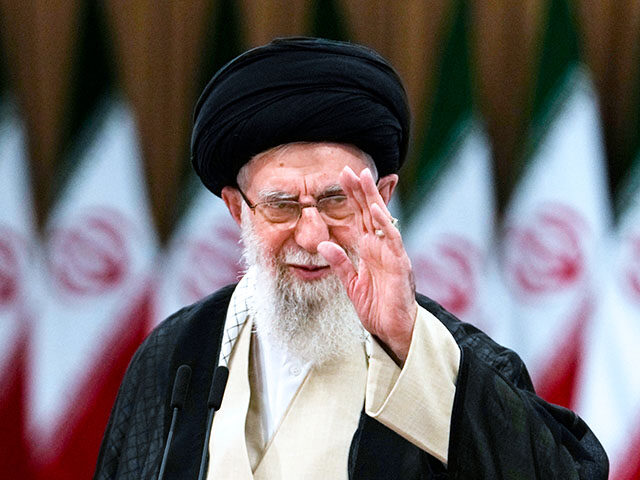Iranian Supreme Leader Ayatollah Ali Khamenei hinted on Tuesday that he could be open to resuming limited nuclear negotiations with Iran’s great “enemy,” the United States.
He also advised civilian government officials not to trust anything the “enemy” says during those negotiations.
WATCH — Top House Armed Services Dem: We Have “Adequate Deterrent” in Middle East, But Iran Turned Terrorists “Loose”:
The Supreme Leader was firm on regarding the U.S. as a deeply distrusted adversary, but said Iran can still “interact with the same enemy in certain situations.”
“There is no harm in that, but do not place your hopes in them,” he said. “Do not trust the enemy.”
Khamenei, who has absolute power and final say over international relations under Iran’s authoritarian theocracy, made his remarks while speaking with President Masoud Pezeshkian and his cabinet.
Pezeshkian, billed as a “moderate” and “reformer,” was the surprise winner of the July emergency election to replace President Ebrahim Raisi, who was killed in a helicopter crash in May. Pezeshkian’s candidacy was supported by the marginalized “moderate” wing of Iranian politics that negotiated the 2015 nuclear deal with former President Barack Obama.
In fact, the new president’s first pick for vice president was the chief negotiator of the deal, former foreign minister Mohmmad Javad Zarif, but he quickly resigned because he disagreed with Pezeshkian’s choices for cabinet minister. Zarif just as suddenly un–resigned on Tuesday, seemingly pleased with the Ayatollah’s support for resuming nuclear negotiations.
“My colleagues and I in the steering council and committees take pride in the fact that nearly 70% of the ministers and vice presidents, along with numerous deputy ministers and organizations, stem from expert recommendations derived from this transparent and inclusive process,” Zarif said in a post on social media, essentially taking back the entire reason he ostentatiously resigned from the vice presidency less than three weeks ago.
WATCH — White House on Iran Getting Sanctions Waivers, Funding Anti-Israel Protests: We’re Working to Hold Them Accountable:
“Following the thoughtful follow-ups and consultations led by the president, along with his written directive, I am committed to resuming my responsibilities in the Strategic Vice Presidency, with faith in Allah and the support of our great nation,” he said.
Pezeshkian campaigned on improving ties with the West and said he favored resuming nuclear negotiations to lift crushing sanctions and “normalize relations with the world.” As with all Iranian leaders, including the most bloodthirsty hardliners, he insisted Iran’s defense plan “does not include nuclear weapons.”
Iran-watchers have been curious to see how much room the hardline Supreme Leader would give Pezeshkian to negotiate. The U.S. State Department did not seem terribly impressed by the signals Khamenei sent in his remarks to the cabinet on Tuesday.
“We have long said that we ultimately view diplomacy as the best way to achieve an effective, sustainable solution with regard to Iran’s nuclear program. However, we are far away from anything like that right now given Iran’s escalations across the board, including its nuclear escalations and its failure to cooperate,” the State Department said.
“If Iran wants to demonstrate seriousness or a new approach, they should stop nuclear escalations and start meaningfully cooperating with the IAEA,” the statement added.
The International Atomic Energy Agency (IAEA), the U.N.’s nuclear watchdog, has been complaining for years about Iran refusing to fully cooperate with its inspectors. IAEA chief Rafael Grossi denounced Iran’s level of cooperation as “completely unsatisfactory” after a visit to Tehran in May.
Council on Foreign Relations (CFR) senior fellow Ray Takeyh told the New York Times (NYT) on Tuesday that although Iran insists it has no interest in the outcome of the 2024 U.S. presidential election, Tehran would be far more likely to negotiate with an extended Biden administration under his vice president, Kamala Harris.
“Many people in the previous [Iranian] administration did not think they could negotiate with Trump because they saw him as unpredictable. This is essentially establishing the parameters for negotiations should Kamala Harris win,” Takeyh said of Khamenei’s remarks.
Iran’s potential retaliation against Israel for the liquidation of Hamas terrorist leader Ismail Haniyeh in Tehran last month could also have a major impact on whether Iran pursues renewed negotiations with the West, and whether even the Harris or Biden administrations would be willing to talk with them.
Iran has said the U.S. “bears responsibility” for Haniyeh’s death along with Israel, and Iranian officials have threatened to extend their “blood vengeance” for Haniyeh to attacking Americans as well as Israelis. No party has yet claimed responsibility for the bombing that killed Haniyeh.

COMMENTS
Please let us know if you're having issues with commenting.